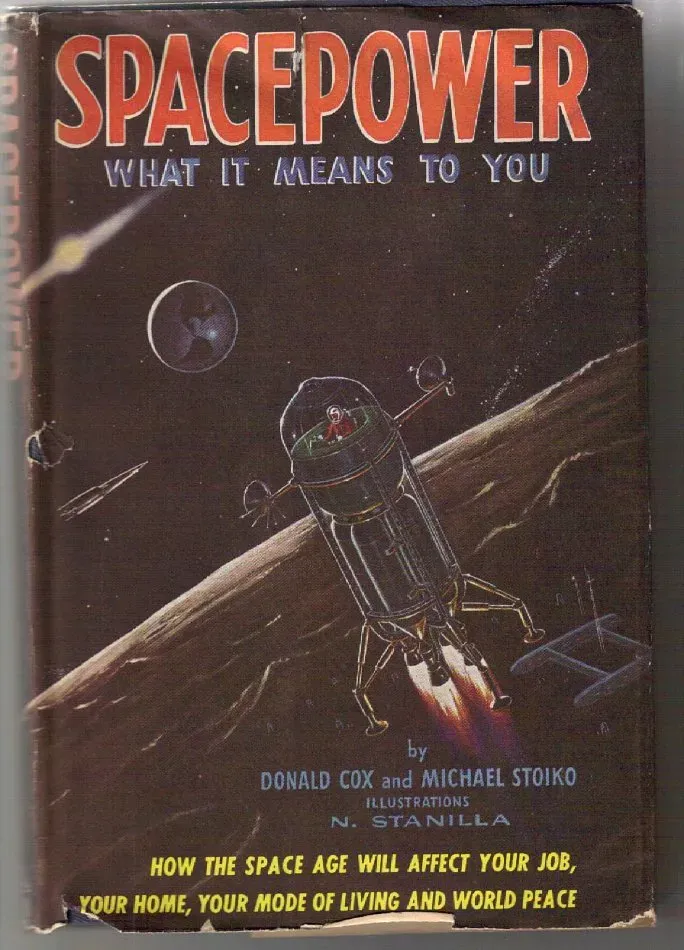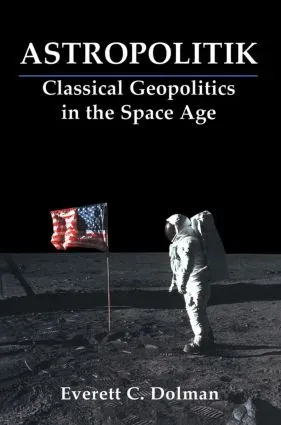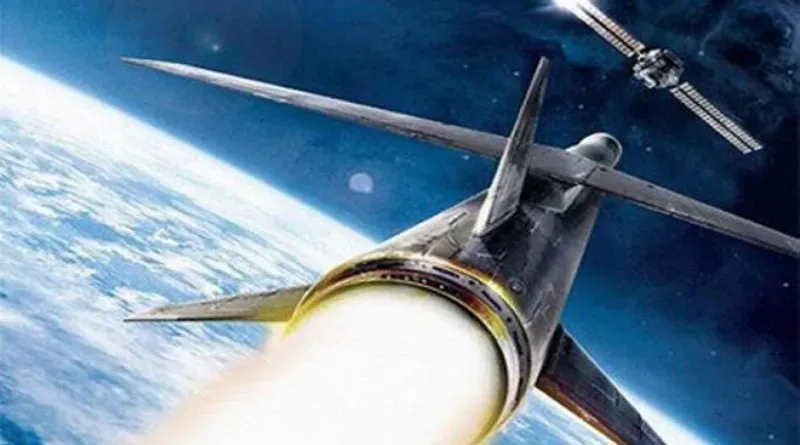An Astronautical Engineer's Spacepower Theory Reading List
Spacepower literature is huge! How can you go about learning about spacepower? What philosophies and conclusions exist?

In a previous article I summarized the concept of Spacepower, what is is, and why it's important. Learning about the topic over the past few years I've begun to develop a list of relevant resources. While writing my last article I came to the conclusion that motivated Spacepower Theory students might be interested in seeing how I've been trying to teach myself the subject! So, what composes Spacepower Theory literature, how can we categorize these sources, and what (abbreviated) reading list would I recommend?
Spacepower Theory is the body of literature describing how national instruments of power are applied in the space domain in pursuit of national prosperity and security. One way to categorize different philosophies and conclusions of Spacepower Theory is using the Sanctuary, Survivability, High-Ground, and Space Control schools of thought. A suggested reading list is provided for the intrepid Spacepower Theory student.
To understand this Spacepower Theory literature at a deeper level, we need to 1) review the precursors to Spacepower Theory, 2) apply geopolitics to space, and 3) attempt to categorize and list a subset of Spacepower Theories. I should note - I'm writing this article partially for my own benefit - as a study guide! I beg forgivingness from authors whose work I misrepresent!
Nevertheless, let's get on with it!
1) Foundations of Spacepower Theory
There are whole books written on the history and literature of national power, let alone landpower, seapower, airpower, and spacepower theory. Foundational sources show up again and again. Here I introduce a bare minimum set of these references.
I omit the famous text Art of War by Sun Tzu only in the interest of brevity! On the other hand, famous for the quote that "War is the continuation of policy with other means," On War by Carl Von Clausewitz is foundational to most modern theories of national power.
- Carl Von Clausewitz, On War, 1832.

Leveraging historical analysis and a principles-driven approach, most modern seapower theories (you'll see why this relates to spacepower later) build upon work by Adm. Alfred T. Mahan and Sir Julian S. Corbett.
- Alfred T. Mahan, The Influence of Sea Power Upon History, 1890.
- Julian Corbett, Some Principles of Maritime Strategy, London, 1911, US Naval Institute Press, 1988.
Rounding out this short list on national power, the theory of indirect strategy introduced by Liddell Hart is another foundational work.
- B. H. Liddell Hart, Strategy, Pickle Partners Publishing, (1st ed. in 1954) 2016.
The first writings on Spacepower Theory began appearing - quite naturally - during the first stirrings of great power competition over space. I'm talking about the Space Race of the 1950s-70s.
- Donald Cox, Michael Stoiko, Spacepower: What It Means To You Winston, 1958

Cox and Spialto's text speaks more to the hope and ambitions of the post-WW2 environment than the Cold War; it's a good read in that sense. Speaking of the Cold War and space in the 90s, Astronomer Carl Sagan wrote:
"Governments do not spend these vast sums just for science, or merely to explore. They need another purpose, and it must make real political sense." (pg. 215, Pale Blue Dot)
At the end of this tumultuous period, and just before Carl Sagan's comments, McDougal wrote a Pulitzer-Prize-winning history of the space race.
- McDougall, W A. ... The Heavens and the Earth: a political history of the space age United States: N. p., 1985. Web.
While neither Cox nor McDougall are proposing theories of spacepower, many have recognized the challenges involved in developing such a theory:
"Developing a theory of space power is made doubly difficult because, unlike the sea, space is an untested domain." (pg. 14, Space Power and the Foundations of an Independent Space Force)
Most Spacepower Theories can trace their inceptions back to the Cold War. Theorists and space practitioners grappled with the challenge of understanding and extending landpower, seapower, and airpower to the space domain. How do these principles of conflict apply to a domain in which no conflicts have yet been fought?
The rest of this article attempts to organize existing publications on Spacepower Theory. I need to emphasize that I have not yet read and digested all of these references. Charitably, I've only read about one-third of them. I offer my apologies in advance for any misrepresentations!
In parts I borrow from Brian E. Fredriksson, David E. Lupton, Bradley Townsend, and Joshua Carlson, while adding my own twists.
I hope that all authors mentioned and omitted forgive any errors!
2) Classical Geopolitics and Space
Realpolitik is a classical form of geopolitics made famous by the 19th century German Chancellor, Otto Von Bismark. It is also famous for exacerbating the worst excesses of the wars of the 20th century.
A highly regarded work with a novel comprehensive Spacepower Theory is Astropolitik:
- Everett C. Dolman, Astropolitik: Classical Geopolitics in the Space Age, Routledge, 2001.
In the author's own words:
"In its narrowest construct, Astropolitik is the extension of primarily nineteenth- and twentieth-century theories of global geopolitics into the vast context of the human conquest of outer space." (pg. 16, Astropolitik)
"Astropolitik, like Realpolitik, is hardnosed and pragmatic, it is not pretty or uplifting or a joyous sermon for the masses. But neither is it evil. Its benevolence or malevolence will become apparent only as it is applied, and by whom." (pg. 20, Astropolitik)
Dolman emphasizes that the term Astropolitik is intentionally chosen to remind us of the danger and pitfalls of a 'no-holds-barred' approach to Spacepower Theory. He reiterates that, while it may not be the approach we wish to use, we should be aware of it in case someone takes that approach.

3) Schools of Spacepower Theory
In his thesis, On Space Warfare: A Space Power Doctrine, Lt. Col. David E. Lupton categorizes spacepower theories into several 'schools' depending upon their philosophies and conclusions. In a later thesis, Lt. Col. Brian Fredriksson performs a similar analysis of the literature. Both are good reviews in their own right, and both are products of the United States Air War College.
- David E. Lupton, On Space Warfare: A Space Power Doctrine, Thesis, Air University Press, 1998.
- Brian E. Fredriksson, Globalness: Toward a Space Power Theory, Thesis, Air University Press, 2006.
At my own peril, I will attempt to categorize different spacepower theories into each of these (sometimes with help from Lupton and Fredriksson).
Sanctuary School
Spacepower Theory in the Sanctuary School depends upon deterrence to ensure that space is a war-free zone devoid of weapons. This line of thought formed the basis of the first space policies implemented during the Eisenhower administration.
"According to its advocates, the primary value of space forces is their ability to reduce the probability of global nuclear war." (pg. 21, On Space Warfare: A Space Power Doctrine)
This theory of spacepower is the one we all wish we could apply; we all hope that space will remain devoid of violence and conflict.
"Phrases such as space power and space forces cause an intense, unfavorable reaction in the United States. The average American citizen views space as the responsibility of the National Aeronautics and Space Administration (NASA) and its peaceful exploration programs, such as the one that put men on the moon." (pg. 1, On Space Warfare: A Space Power Doctrine)
Interestingly, nuclear deterrence is a central element of the Sanctuary School. In other words, the Sanctuary School depends upon Mutually Assured Destruction to deter the militarization of space (and deterrence in general).
Some relevant sources include:
- James Clay Moltz, The Politics of Space Security: Strategic Restraint and the Pursuit of National Interests, Third Edition Stanford University Press, 2019 (3rd Ed.; 1st Ed. is 2008, 2nd Ed. is 2011)
- James Clay Moltz, Crowded Orbits: Conflict and Cooperation in Space, Columbia University Press, 2014
Survivability School
This school suggests that low-Earth Orbit (LEO) is where the majority of value is derived from space, whether from economic or military applications. The Survivability school also emphasizes how vulnerable LEO is to disruption or destruction by actors.
Their conclusion, then, is to develop capabilities to deny access to space to others and avoid placing systems critical to national power within space (and thus exposing them to these dangers).

Lupton takes a dim view on the Survivability School, stating:
"In sum, the survivability doctrine has little to offer. It is built on the false tenet that space forces are inherently vulnerable." (pg. 49, On Space Warfare: A Space Power Doctrine)
Perhaps that is why I wasn't able to find many Spacepower Theories that easily fit this mold; I encourage the intrepid spacepower theorist to contact me and offer some!
High-Ground School
A foundational tenet of the High-Ground School is that space is a battlespace, and that the strategy of mutually assured destruction must be replaced with a strategy of assured survival.
This places the High-Ground School directly in opposition to the Sanctuary School. One concern is that a transition to a strategy of assured survival in the event of nuclear attack is destabilizing to current geopolitics.
A flagship program for High-Ground proponents and assured survival were the so-called 'Star Wars' programs of the 1980s. Their intent was to provide credible ballistic missile defense (BMD) against nuclear attack, ensuring both reprisal and survival. A relevant spacepower theory is:
- Michael R. Mantz, The New Sword: A Theory of Space Combat Power, Air University Press, 1995.
While BMD approaches continue to be tested by the United States, they remain a work in progress.
Space Control School
If you were to synthesize Mahan, Corbett, and Dolman, then look for a place between the Sanctuary and High Ground Schools, you might arrive at the Space Control School.
In the Space Control School, terrestrial and space forces are considered co-equal - they're simply different instantiations of instruments of national power. This school also borrows much (including its name) from Mahan and Corbett Seapower writings on control of the seas. The founding dictum is supplied by Everett Dolman in Astropolitik:
"[I]n accordance with the examples set by Sir Halford Mackinder and Nicholas Spykman, the formulation of a neoclassical astropolitical dictum is established: Who controls low-Earth orbit controls near-Earth space. Who controls near-Earth space dominates Terra. Who dominates Terra determines the destiny of humankind." (pg. 27, Astropolitik - emphasis added)
Provided one cares about the destiny of humankind, one would want to control LEO.
The Space Control School dominates most of the literature in Spacepower Theory. In fact, it appears to be a central element of the United States Space Force (USSF) Spacepower Doctrine.
It would be a mistake to try and give a one sentence summary of each of the following works, particularly if I haven't yet read and digested all of them! In any event, they are listed here in chronological order:
- Colin S. Gray, The influence of space power upon history, Comparative Strategy, 15:4, pp. 293-308, 1996
- James Oberg, Space Power Theory, US Air Force Academy, 1999
- Martin E. B. France, Back to the future: space power theory and A.T. Mahan, Space Policy 16, pp. 237-241, 2000.
- John G. Fox, Some principles of space strategy (or ‘Corbett in orbit’), Space Policy, Volume 17, Issue 1, pp. 7-11, February 2001.
- M. "Coyote" SmithTen Propositions Regarding Space Power, 2004
- John J. Klein’s Space Warfare: Strategy, Principles and Policy, Routledge, 2006
- Brent Ziarnick Developing National Power in Space: A Theoretical Model, McFarland, Incorporated, Publishers, 2014
- Joan Johnson-Freese, Space Warfare in the 21st Century: Arming the Heavens, Routledge, 2016
- Bradley Townsend, Space Power and the Foundations of an Independent Space Force, Air & Space Power Journal, Winter 2019.
- Spacepower - Doctrine for Space Forces USSF Capstone Publication, 2020
- Joshua Carlson, Space Power Ascendant, Amazon Digital Services LLC - Kdp, 2020
- Bleddyn E. Bowen, War in Space: Strategy, Spacepower, Geopolitics Edinburgh University Press, 2020
- John J. Klein, Understanding Space Strategy: The Art of War in Space, Routledge,2020
- John E. Shaw, Jean Purgason, Amy Soileau, Sailing the New Wine-Dark Sea, ÆTHER: A Journal of Strategic Airpower and Spacepower, 1(1), 2022
Other Works Related to Spacepower
Drawing an arbitrary line between 'Spacepower Theory' proper and adjacent writing, the following texts are extremely relevant (again, in chronological order):
- Lutes et al., Toward a Theory of Spacepower: Selected Essays, National Defense University, Edited Volume, Taylor Francis, 2011.
- Linda Dawson, War in Space: The Science and Technology Behind Our Next Theater of Conflict, Springer, 2018
- John C. Wright, Deep Space Warfare: Military Strategy Beyond Orbit, McFarland, 2019
- Namrata Goswami, Peter A. Garretson, Scramble for the Skies: The Great Power Competition to Control the Resources of Outer Space, Rowman & Littlefield, 2020.
- Daniel Deudney, Dark Skies: Space Expansionism, Planetary Geopolitics, and the Ends of Humanity, Oxford University Press, 2020
- J. P. Springett II, The American Space Commercialization Strategy, Amazon Digital Services LLC - Kdp, 2021
Summary
What I originally thought would be a short article to write has turned into one of the longest. Nevertheless, I think there is value in the included material. In particular, in this article:
- I give the briefest review on foundational material for spacepower theories. Texts by Clausewitz, Mahan, Corbett, and Hart feature prominently.
- Several spacepower theory schools of thought are introduced, specifically the Sanctuary, Survivability, High-Ground, and Control schools. The Space Control school (by far) has the most literature.
- I have provided a reading list of original sources for the interested learner.
Subscribe to the Newsletter
If you enjoy this content, show your support by subscribing to the free weekly newsletter, which includes the weekly articles as well as additional comments from me. There are great reasons to do so, and subscriptions give me motivation to continue writing these articles! Subscribe today!


